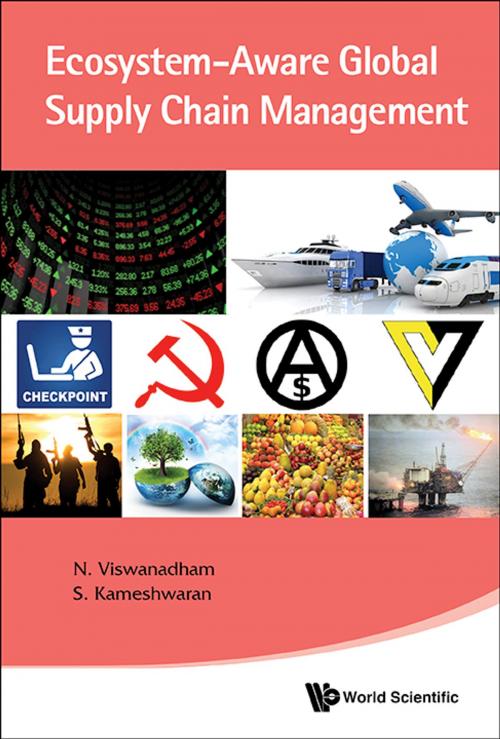Ecosystem-Aware Global Supply Chain Management
Business & Finance, Management & Leadership, Production & Operations Management, Management| Author: | N Viswanadham, S Kameshwaran | ISBN: | 9789814508186 |
| Publisher: | World Scientific Publishing Company | Publication: | May 14, 2013 |
| Imprint: | WSPC | Language: | English |
| Author: | N Viswanadham, S Kameshwaran |
| ISBN: | 9789814508186 |
| Publisher: | World Scientific Publishing Company |
| Publication: | May 14, 2013 |
| Imprint: | WSPC |
| Language: | English |
Over the last two decades, several textbooks, research papers, and best practice cases have been published on supply chain management. However, globalization has created dispersed supply chains which are vulnerable and dependent on entities and factors that are exogenous to the supply chain. Resource scarcity, environmental regulations, government policies, political unrest, economic instability, and natural disasters are a few examples of how non-supply chain factors influence the way supply chains are managed. These exogenous factors are not just risk sources but can also be venues for innovation and growth.
This book presents the notion of supply chain ecosystem to holistically model all the factors that interact with the supply chain and influence the flow of goods, information, and finance. Through a number of real-life case studies, the authors use the ecosystem framework to study the governance, risk, innovation, and performance issues in supply chain management, and also to redesign the management techniques for global supply chains. In doing so, this book makes a unique contribution to the theory and practice of supply chain networks.
Contents:
-
Ecosystem Framework:
- Introduction
- The Supply Chain Ecosystem Framework
- Performance Analysis
- Supply Chain Risk
- Innovation
- Governance, Coordination, and Control
- Global Supply Chain Redesign
-
Applications:
- Location Analysis
- Green Supply Chains
- Smart Villages and Cities
- Epilogue
Readership: Academics, researchers, and undergraduate and graduate students in courses on supply chain engineering and operations management; managers wishing to gain insights into global supply chain network issues.
Key Features:
- Presents a new framework — the Supply Chain Ecosystem — for redesign of global supply chain networks with emphasis on governance, risk, innovation, and performance, thereby filling a gap in the literature
- Illustrates the generality and practicality of the ecosystem framework through various applications, e.g., location analysis, green supply chain design, and smart villages and cities
- Both authors are well-respected academics, with high industry orientation. Their experience and insights into the logistics and supply chain fields in the Asia-Pacific region are reflected in the book
Over the last two decades, several textbooks, research papers, and best practice cases have been published on supply chain management. However, globalization has created dispersed supply chains which are vulnerable and dependent on entities and factors that are exogenous to the supply chain. Resource scarcity, environmental regulations, government policies, political unrest, economic instability, and natural disasters are a few examples of how non-supply chain factors influence the way supply chains are managed. These exogenous factors are not just risk sources but can also be venues for innovation and growth.
This book presents the notion of supply chain ecosystem to holistically model all the factors that interact with the supply chain and influence the flow of goods, information, and finance. Through a number of real-life case studies, the authors use the ecosystem framework to study the governance, risk, innovation, and performance issues in supply chain management, and also to redesign the management techniques for global supply chains. In doing so, this book makes a unique contribution to the theory and practice of supply chain networks.
Contents:
-
Ecosystem Framework:
- Introduction
- The Supply Chain Ecosystem Framework
- Performance Analysis
- Supply Chain Risk
- Innovation
- Governance, Coordination, and Control
- Global Supply Chain Redesign
-
Applications:
- Location Analysis
- Green Supply Chains
- Smart Villages and Cities
- Epilogue
Readership: Academics, researchers, and undergraduate and graduate students in courses on supply chain engineering and operations management; managers wishing to gain insights into global supply chain network issues.
Key Features:
- Presents a new framework — the Supply Chain Ecosystem — for redesign of global supply chain networks with emphasis on governance, risk, innovation, and performance, thereby filling a gap in the literature
- Illustrates the generality and practicality of the ecosystem framework through various applications, e.g., location analysis, green supply chain design, and smart villages and cities
- Both authors are well-respected academics, with high industry orientation. Their experience and insights into the logistics and supply chain fields in the Asia-Pacific region are reflected in the book















